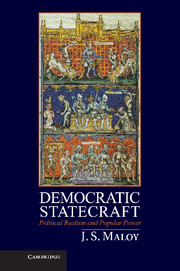6 - From the Puritans to the Populists
Money Never Sleeps
Published online by Cambridge University Press: 05 March 2013
Summary
Elector, noun. One who enjoys the sacred privilege of voting for the man of another man’s choice.
Ambrose Bierce, The Devil’s DictionaryThe most dangerous thing about the Populist movement of the 1880s and 1890s was that it threatened to expose American political ideals as idols, fictions deliberately deployed as the tools of oligarchic statecraft. If that isn’t enough to clinch our interest, the Populists also happened to confront classic problems of statecraft and democratic power in a new kind of environment which has since become utterly familiar the world over, like a jailer to a long-term inmate: a political system surrounded by national parties, mass communications, and economic corporations.
According to most Populists, James Madison and the other founders of the U.S. Constitution of 1787 were no fans of oligarchy and were strenuously opposed to tyranny of any kind, yet their constitutional prophylactics against oligarchy and tyranny had been busted after a respectable run of 100 years. The Madisonian plan was to prevent the capture of a coherent center of political power by creating a complicated governmental machinery with multiple centers, scattered both within the national government and across the states. As The Federalist, no. 10, famously explained, if there are multiple centers of power needing capture, it’s unlikely that any single faction or coalition will take all those centers at once. This solution seemed to lose its relevance in changing times: nationwide parties, nationwide communications, and nationwide business firms made it possible for organized minorities in American society to coordinate the capture of multiple centers of political power at once. The Populists were among the first to acknowledge this nasty surprise and to wade into the cold, murky waters of “what next?”
- Type
- Chapter
- Information
- Democratic StatecraftPolitical Realism and Popular Power, pp. 145 - 188Publisher: Cambridge University PressPrint publication year: 2013



